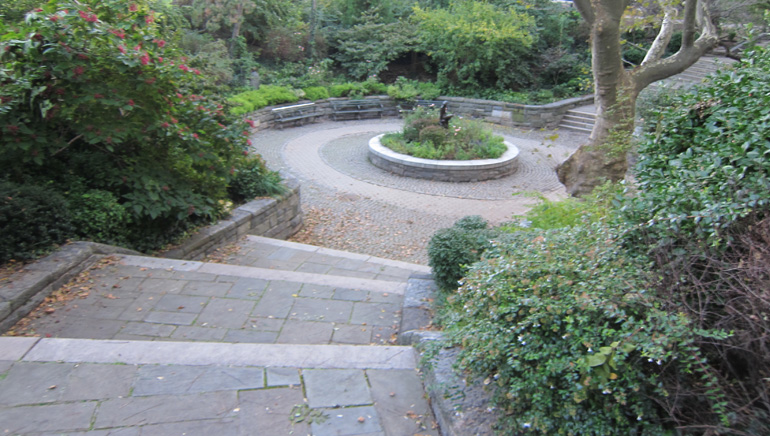Gotham Diary:
Being There
15 November 2011
What with packing and preparing for our Thanksgiving break, I’m finding it difficult to hear words well enough to write them down….
The very thought of leaving this apartment for a week is horribly disturbing. I used to hate travel, and I still do. But I hate leaving home even more. It’s not quite the same thing. I hate, for example, leaving home in the evening; I don’t like to go out at night anymore. What I want to do when it gets dark: go to bed. And now, thanks to Lunesta, that’s something that I can do. And then be up at the crack of dawn. It sounds crazy, except of course that in terms of natural human life, it could not possibly be more normal.
I want to write about James Wolcott’s memoir, Lucking Out, but first I’ve got to get a haircut, so that I don’t look too shaggy in St Croix. … And now I find that I neglected to update this entry on my way out the door. The barber thanked me for sending him a copy of the postcard that I had made of Will outside his shop (Willy’s, come to think of it) after his last haircut. I can’t say that the card was proudly displayed, but it was tucked into a shelf so that the half with Will in it showed.
James Wolcott — I mentioned a while back (last week, actually) that I picked up Lucking Out because I thought it might help me puzzle out why it is that I never pursued a career in journalism. Aside from the obvious, that is (I am much more curious about what people think than about what they do, I prefer to work in a quiet, well-appointed space, and don’t have much use for “news” as such). It didn’t take long for me to figure out that I could not have borne the locker-room atmosphere of mid-century journalism, with its insistent masculinity (a spinelessly overcompensating concession, ultimately, to the arrant philistinism of American life), and its dependence on metaphors of war and violence. All of this was embodied in “literary figures” whom I had and still have no time for: Norman Mailer, Tom Wolfe, Hunter Thompson. If I had tried to stick it out, I’d have died of drink and drugs before I was thirty. Of drink and drugs and dire demoralization.
But I kept reading Lucking Out, and, in the end, I enjoyed it — as a book. Wolcott is funny, modest in his way, and literate certainly; it was also a pleasure to read that the punk scene at CBGB’s, for example, was as insupportable as I’d thought it must have been. (Why anyone wants to spend a single non-excretory second in an atmosphere redolent of urine is beyond me, but Wolcott jumps right in and makes piss sound like the house champagne.) And then, there’s his friendship with Pauline Kael. Kael could be fun to read, I remember, but I never agreed with her about pictures that I’d seen, or wanted to see anything on her say-so. And I’m appalled to learn that she never saw films a second time. (The one exception, according to Wolcott, was the druggily dull McCabe and Mrs Miller.) I never know whether a picture’s any good until I’ve seen it a second time, a few months after the first. And I think that the Seventies, by and large, were gassy and unattractive, as most times of transition seem, on the historical record, to be.
I didn’t know what to make of the conceit of the fourth part’s juxtaposition of Wolcott’s interests in porn and ballet, but it was the “we were there” enthusiasm of his writing about the latter that registered another difference between us. And I’m speaking of a difference between us now, not as we were as young men (I believe that I’m vaguely older than Wolcott). I can’t find a truly apposite quote, I’m afraid, and it’s possible that there isn’t one, but I drew from Lucking Out the impression of a man who went out every night in search of memorable events. A man who now, writing about his youth, is thrilled to have encountered so many. He was there was Suzanne Farrell returned to City Ballet; he was there when Darci Kistler returned. He remembers the excitement in the audience. I wasn’t there, but I can’t imagine writing about it if I had been, unless it were to agree with or contradict a point.
Thinking about this made me realize why I remember so little of my own past. Our strongest memories (also our least reliable) are the ones that are reinforced by recollection itself. The reason why I’m up on a lot of dates in English history, say, is that I read a lot of English history; information that I already “possess” gets refreshed fairly regularly. But my recollections of evenings at the Houston Grand Opera are pretty threadbare. I don’t think that I could fill two pages with descriptions of what I remember, and almost everything that I said would be vague. I remember something about the harsh lighting in one of the scenes in Samuel Ramey’s Don Giovanni, for example. I remember Rudolph Nureyev prancing around in the most beautiful green costume in his pocket adaptation of Raymonda (and what fun the music was! I was mad about it for months afterward). The End.
The point is that what happend thirty, twenty, ten or even five years ago isn’t very interesting to me. It’s what’s happening right now that has my full attention — not that there’s anything the least bit exciting about writing in a room while La Valse oom-pahs in a corner. I only wish things were less exciting! But I’ve got to pack, so you’ll excuse me….

